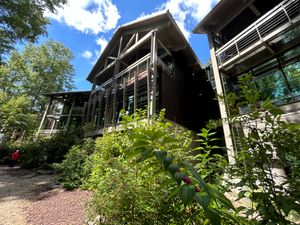
Environmental professionals from HOK, Jacobs, and Biomimicry 3.8 joined Catawba staff at Catawba College’s Center for the Environment for an immersive, hands-on learning experience. They came, united by a single goal: to measure natural functions better and understand nature using a new modeling system.
Led by Morgan Erhardt, Kenna Halsey, and Kevin Halsey, ecologists and modelers at EcoMetrix Solutions Group, the training used Catawba’s campus as a living laboratory. Participants learned to model land use scenarios across a variety of plots of land on campus. The model predicts outcomes that can be used both in the classroom and in real-world professional applications.
Using geospatial analysis, ecological data, and proprietary environmental metrics, EcoMetrix helps organizations understand and quantify the value of ecosystems. These include benefits such as clean air, water filtration, carbon cycling, and biodiversity. Traditionally, such modeling has been limited to environmental consultants. This training represents a significant shift. It marks the beginning of efforts to equip students and professionals with tools to measure and improve the health of natural systems.
"This was more than a workshop. It was a glimpse into the future," said Dr. Lee F. Ball, Jr., Executive Director of Catawba’s Center for the Environment. "Where small acts once chipped away at ecosystems, we now have the opportunity to support life through a thousand intentional interventions. Ecosystem Intelligence does exactly that."
Student participants left inspired by the possibilities. “Our country is filled with manicured lawns and decorative shrubbery,” said Isaac Haut, MBA Intern at the Center. “But what if food forests, pollinator gardens, and native plantings became the new standard? What if data could prove their value in terms of ecosystem performance, and reshape how businesses, campuses, and communities care for their land?”
That vision is already being realized at Catawba. The new residence hall project on campus incorporated Ecosystem Intelligence to inform its landscaping strategy. The model projected benefits in human comfort, air and water quality, and biodiversity. During the training, the EcoMetrix team also completed a high-level model for the City of Salisbury, offering a broader glimpse at the platform’s local impact.
By hosting this milestone training, Catawba College has taken an important step toward becoming a hub for regenerative design education. The College is empowering students, professionals, and community leaders with the tools to shape a healthier and more sustainable world by educating everyone on how to improve and understand the natural functions of land plots of any size.
